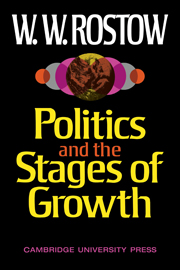Book contents
- Frontmatter
- Contents
- Tables
- PREFACE
- INTRODUCTION
- 1 A way of looking at politics
- 2 Politics in pre-Newtonian societies
- 3 The politics of the preconditions for take-off
- 4 The politics of the take-off and the drive to technological maturity
- 5 American politics: a not so special case
- 6 The politics of the search for quality
- 7 Politics and democracy in the contemporary developing world
- 8 War and peace in the global community
- APPENDIX: The views of others in relation to the approach taken here
- NOTES
- INDEX
2 - Politics in pre-Newtonian societies
Published online by Cambridge University Press: 16 October 2009
- Frontmatter
- Contents
- Tables
- PREFACE
- INTRODUCTION
- 1 A way of looking at politics
- 2 Politics in pre-Newtonian societies
- 3 The politics of the preconditions for take-off
- 4 The politics of the take-off and the drive to technological maturity
- 5 American politics: a not so special case
- 6 The politics of the search for quality
- 7 Politics and democracy in the contemporary developing world
- 8 War and peace in the global community
- APPENDIX: The views of others in relation to the approach taken here
- NOTES
- INDEX
Summary
WHY NEWTON?
What distinguishes the world since the industrial revolution from the world before is the systematic, regular, and progressive application of science and technology to the production of goods and services. The resulting flow of innovation has been an additional factor of production which has the special characteristic that it is, so far as we know, indefinitely expansible. And the organized creativity of the human mind appears thus far to be of a productivity capable of compensating for limitations of land and natural resources. Thus, for two centuries have societies, which organized themselves to exploit the innovational stock and flow, fended off Ricardian diminishing returns to land and the Malthusian spectre. Only now have the rate of population increase and threats to the environment cast a shadow over the efficacy of the Newtonian revolution; although science and technology will surely play a part if man succeeds in coming to stable terms with his physical environment.
A number of conditions were required to achieve this transformation, but the most basic change was psychological. It was the acceptance of the view that the physical world is capable of being understood and manipulated in terms of a relatively few stable rules which man could master. It is for that reason that Newton's concepts represent a watershed in history. As with Marx and Freud, it mattered little that few read and understood Newton. It mattered greatly, as with other great intellectual revolutionaries, that a new perspective could be vulgarized in the coffee houses and suffuse the life and work of many men.
- Type
- Chapter
- Information
- Politics and the Stages of Growth , pp. 26 - 53Publisher: Cambridge University PressPrint publication year: 1971



